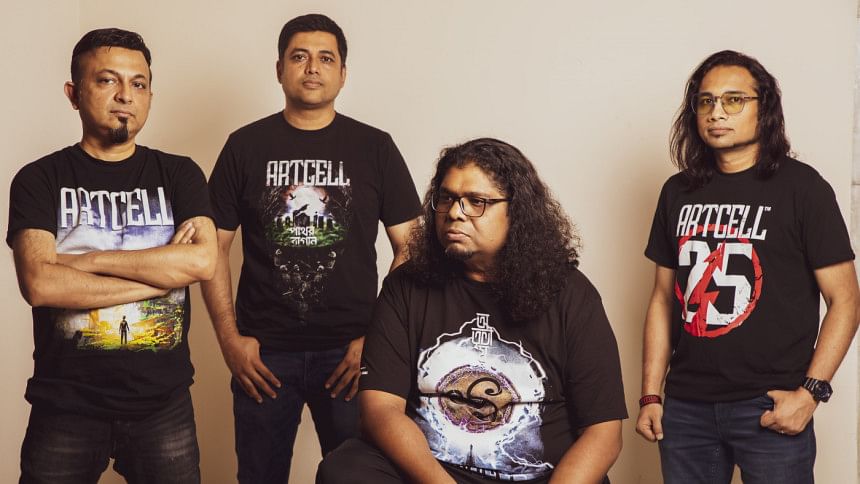Artcellism lives on

In the dim light of a cosy studio, the air thick with anticipation, I found myself face-to-face with the rock legends of our country. The members of Artcell, clad in their iconic black band t-shirts, lounged before me with an air of casual camaraderie that belied their status in Bangladesh's rock pantheon.
As I was preparing for the camera to roll, a humbling realisation struck me—this band had been crafting sonic masterpieces before I had even mastered my mother tongue. Their creations, like— "Oniket Prantor", "Onno Shomoy", "Obosh Onubhutir Deyal", "Amar Poth Chola", "Dhushor Shomoy"—had become the soundtrack to a generation's hopes, dreams, and rebellions.
Twenty-five years. A lifetime for some, a blink of an eye for others. For Artcell, it represented a journey etched in power chords and poetic lyrics, a reflection of their enduring impact on Bangladesh's musical landscape.

As the four members from the current lineup—George Lincoln D'Costa, Kazi Faisal Ahmed, Kazi Asheqeen Shaju, and Iqbal Asif Jewel—graced The Daily Star studio, they talked about their 25-year celebration, recent tour, future projects, and more.
To mark their silver jubilee, Artcell embarked on an ambitious international tour. Lincoln D'Costa shares, "We kicked off our celebration with a tour starting in Australia, followed by performances across nine Canadian provinces."
The Canadian leg proved particularly significant, with shows in major cities like Toronto, Vancouver, Halifax, and Winnipeg. Notably, Artcell made history as the first Bangladeshi band to perform in St John's, Newfoundland, and Regina, Saskatchewan. Band member Saef Al Nazi Cezann, currently residing in Australia, rejoined the group for this tour.

Shaju highlights the unique connection experienced during these performances. "We reconnected with fans from our RCC days, many now settling into careers or pursuing PhDs. It's a rare opportunity to engage so intimately with our audience, something we don't often experience during larger gigs back home."
The tour, organised by Toronto-based MNC Entertainment, allowed Artcell to showcase a broader repertoire. Jewel explains, "In Bangladesh, mixed concerts often limit us to our greatest hits. In Canada, we had the freedom to play extended sets, as long as two hours, including deeper cuts like 'Rahur Grash', 'Otritio', 'Bhul Jonmo', and 'Dhushor Shomoy'."
"'Bhul Jonmo' wasn't even on our list. The crowd started chanting it and we had to play it on the spot," shares Faisal.

Artcell's popularity was evident in Vancouver, where tickets sold out within three hours, prompting organisers to add an extra show on a weekday. Looking ahead, the band plans to continue its world tour, with the United States as its next destination, alongside performances across Dhaka and several other districts countrywide.
In 2023, Artcell released "Otritio", their third album, following a 17-year hiatus since the massively successful "Oniket Prantor". Lincoln describes the album's ambitious concept, "Conceived over a decade ago, it explores the destination, something that we search for. The destination may seem incomprehensible, miraculous, or unreal at first, but it can be the only truth, and to be comprehended in the future."
He continues, "It holds the history of human civilisation—this is what we tried to preserve. It's like a riddle, and we want the listener to think, about it and ponder over it. It's such a huge concept that it can't be spoon-fed. You need to question, you need to dig in, and you need to find your own truth."
"Lincoln is being cryptic with the answer," interrupts Jewel with a playful smile. He then goes on to elaborate, "This is a concept album, there's a lot of room to think for the listener. This is a story set in the future, blending science, fiction, as well as spirituality. We are questioning everything, from higher powers to the interconnectedness of all things. It's cyclical; if you listen to the tracks, look at the album cover art, and think about it whole—there's no end or beginning to it."
The band acknowledges that "Otritio" hasn't resonated as strongly with audiences as their earlier work. Shaju explains, "We deliberately departed from our conventional approach. As a progressive rock album, we knew it might not immediately appeal to younger listeners. Our goal was to create a conceptual album and make a statement as a band that would remain in history."
"Moreover, the audience prefers content that is catchy, and shorter. We never targeted that crowd. Our songs are 6–7 minutes long. However, the album will be much more appreciated when the listener devotes their time and attention to it," adds Jewel.
Discussing the current state of Bangladesh's music industry, the band reflects on the challenges of creating timeless classics—such as "Oniket Prantor", "Firiye Dao", "Shei Tumi", "Boshe Achi"—in"today's fast-paced, content-saturated environment. Shaju notes, "It's too early to say we're not getting enduring hits. 'Oniket Prantor' was released in 2006. It was around 2012–2013 when it became a hit or achieved its classic status."
Jewel adds, "In our early days, entertainment options were limited. New albums were rare events, allowing listeners to deeply engage with the music. Today's abundance of content makes it harder for songs to leave a lasting impression."
The band also discusses the double-edged sword of digital platforms, which have democratised music distribution by labels but led to content oversaturation. "People are constantly looking for dopamine hits, even videos are becoming too long for their attention span. So, they are switching to reels with a shorter duration. This way, it has become difficult to find that space to grow a loyal fanbase for a song or band. But quality songs are being made—tons of them. We need to listen to them sincerely," he adds.

Jewel further emphasises the collective responsibility to promote quality, "Instead of making low-quality content viral, we must promote quality ones. Otherwise, not just the music industry, art, film, and every other form of media industry will suffer."
On the topic of AI in music creation, Jewel expresses measured scepticism. "While AI has its uses, like restoring old recordings, it can't replicate the emotional depth of human-created music. It's a tool, but not a substitute for genuine creativity."
Shaju adds, "The essence of live performance—our craft and connection with the audience—can never be replicated by AI. That's the heart of what we do."
Artcell hints at several upcoming projects, including a corporate collaboration featuring a music video. Jewel reveals, "We're developing six or seven new tracks and have plans for more. Our creative process is organic; we don't rush to meet external demands."
Reflecting on their enduring success, Lincoln attributes it to "perseverance, consistency, dedication, and passion for music." Jewel adds a nuanced perspective, "Like any band, we've experienced highs and lows. The key is prioritising our love for the craft and mutual respect among bandmates. When you genuinely enjoy the journey, everything becomes worthwhile." The band also acknowledges the crucial role of their loyal fanbase in their continued success.

 For all latest news, follow The Daily Star's Google News channel.
For all latest news, follow The Daily Star's Google News channel. 










Comments